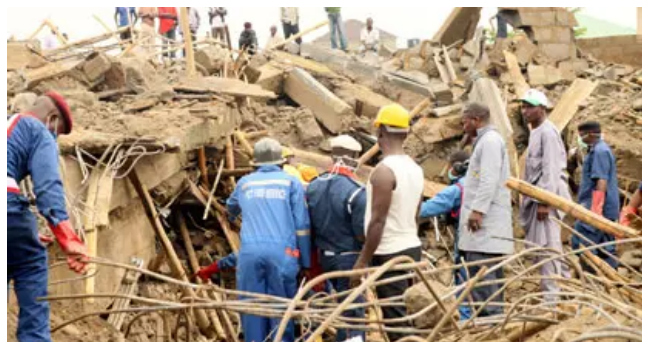The Council for the Regulation of Engineering in Nigeria (COREN), the regulatory body overseeing engineering practices, has reported that Nigeria experienced 22 building collapses between January and July 2024.
COREN President, Prof. Sadiq Abubakar, announced this during a news conference in Abuja on Wednesday.
The event, themed “The Incessant Spate of Building Collapse in Nigeria in Recent Times: A Call for Sustainable Collaboration by All Stakeholders,” highlighted the urgent need for cooperative efforts to address this issue.
Abubakar stated that between January and July 14, Nigeria witnessed at least 22 building collapses. Lagos accounted for 27.27% of these incidents, while Abuja and Anambra each accounted for 18.18%.
Ekiti and Plateau followed with 9.09% each, and Kano, Taraba, and Niger states each represented 4.55%.
“Records also showed that Lagos takes the lead in the incidence of building collapses.
“As a matter of fact, over 91 buildings have collapsed, resulting in the deaths of over 354 persons in Lagos from 2012 to date.
“Similarly, in Abuja, about 30 buildings have collapsed from 1993 until date, resulting in the deaths of more than 64 persons and injury of many.
“The most recent occurrences of building collapses close to DMGS Onitsha, Anambra State, on June 12 and that of a school (Saint Academy) in Plateau on July 13, where 22 students died and 134 were injured, as well as the building collapse in Kubwa, Abuja.
He said that the incidents were worrisome.
According to him, this calls for deep reflection and collaboration among all stakeholders in stemming the tide.
’’While we commiserate with all victims and families, we want to commend the efforts of all emergency and security services for their prompt response at the time.’’
According to Abubakar, the leading causes of building collapses vary by location. He noted that some buildings collapsed due to aging, while investigations and research revealed that the use of substandard construction materials and structural failures were also significant factors.
Additional causes included the illegal change of building use, unauthorized addition of floors, involvement of unqualified personnel, and inadequate or absent supervision and oversight.
Other contributing factors were faulty foundations, lack of soil or geotechnical investigation, and corrupt practices.
Abubakar also praised the affected state governments for setting up panels of enquiry to investigate the various cases, aiming to identify the immediate and underlying causes and prevent future incidents.
“This is not the time for apportioning blame or contest of superiority within the built environment, but a time for all stakeholders to unite and proffer workable and lasting solution, particularly in the prevention of building collapses.
“All professionals within the built environment have a role to play in this.
“In this regard, we have identified and categorised many stakeholders that we will be engaging shortly,’’ he said.
The President said that the proliferation of illegal miners even within residential areas, as reported in some quarters, was a danger to the structural stability of buildings.
He added that the council had therefore, urged affected states to take urgent steps to reverse the trend, adding that it was also time to enforce the compulsory insurance of some buildings under construction.
Abubakar said that, perturbed by the incessant and avoidable incidences of building collapses in Nigeria and loss of lives in recent times, COREN had deemed it necessary to make major moves.
He said that COREN had taken some steps to monitor and prevent building collapses by training and licensing Engineering Regulation Monitoring (ERM) inspectors.
Abubakar added that COREN had reconstituted its Council Committee on Engineering Regulation Monitoring (ERM) and added an additional role of enforcement to its responsibility in line with the amended COREN Act.
He said that COREN had constituted the ERM&E Task Force at regional levels, including Ibadan, Port Harcourt, Enugu, Kano, FCT, Gombe, and Lagos, among other steps to tackle building collapse.



